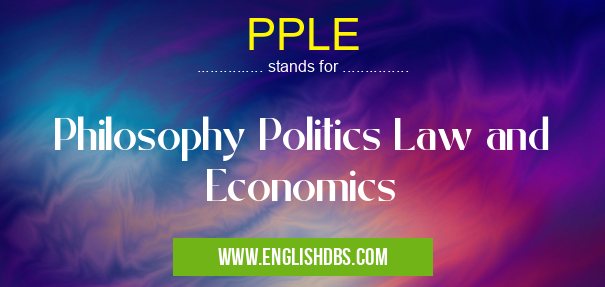What does PPLE mean in ECONOMICS
PPLE is an acronym which stands for Philosophy, Politics, Law and Economics. It’s a field of study that has interconnected links between the four disciplines. The PPLE course contents combine aspects of each subject such as philosophical approaches to morality, political institutions, legal systems and economic theories. It provides students with a basic understanding of how different elements influence social life in societies today. By combining these four distinct fields in one program, it enables students to understand the fundamentals of different disciplines and how they interact with each other.

PPLE meaning in Economics in Academic & Science
PPLE mostly used in an acronym Economics in Category Academic & Science that means Philosophy Politics Law and Economics
Shorthand: PPLE,
Full Form: Philosophy Politics Law and Economics
For more information of "Philosophy Politics Law and Economics", see the section below.
Explaining PPLE
Philosophy – Philosophical studies focus on understanding fundamental principles that govern our world. By studying philosophy students acquire analytical skills which help them analyze complex issues from various angles and gain an insight into the human thoughts about ethical behavior, truth and justice. Courses can include topics such as logic, epistemology or ethics.
Politics – Political science is a discipline which analyzes the development and interaction of policy processes within governments at different levels including international politics, negotiations between states or ethnicity based policies. This field helps individuals understand real-world politics in order to make informed decisions or become more actively involved in modern society.
Law – The law focuses on the study of legal systems; their structure and functions within both national boundaries and international agreements between countries around the world. Students will learn about subjects such as constitutional law, criminal justice or civil procedure law allowing them to gain marketable skills for working in the legal profession or engaging in conversations about current affairs in both public and private settings.
Economics – Economic courses will cover topics such as markets, competition structures or macroeconomic models from both micro- & macro perspectives econometrics or economic theory to provide student with insights into economic systems while developing skills such as data analysis & reasoning needed for decision making process (both private & public).
Essential Questions and Answers on Philosophy Politics Law and Economics in "SCIENCE»ECONOMICS"
What is the scope of Philosophy, Politics, Law and Economics?
PPLE incorporates the study of four distinct but related disciplines. It explores how philosophies, political dynamics, legal frameworks, and economic structures influence and interact with each other. It looks at questions such as morality and justice in the legal system, power dynamics between different countries or regions, and the impact of systemic inequalities on people’s lives. Ultimately, students learn to think critically about power, economics, justice, law and philosophy from both a practical as well as an intellectual perspective.
What are some common topics studied in PPLE?
Common topics studied in PPLE include human rights law, international relations and security studies, public policy analysis and implementation strategies, comparative politics and democracies around the world, ethical issues surrounding development and welfare policies; macro-level economics including labour markets and taxation models; micro-level economics such as supply chain analysis; theories in political philosophy as well as specific areas including liberalism and Marxism; theories in ethics such as utilitarianism or deontological ethics.
What career paths are available for graduates of PPLE?
Graduates of PPLE have a wide variety of career opportunities available to them depending on their interests and skillset. These could include roles in government departments at local or state level; research positions in academia or think tanks; consultancy roles helping organisations develop strategies relating to public policy or international relationships; positions within business organisations that require an understanding of the political economy; journalism careers focusing on areas like global finance or social justice matters; diplomatic roles involving working on behalf of governments to promote their interests abroad.
How does studying PPLE benefit one's career path?
Studying PPLE provides students with an interdisciplinary perspective which can be invaluable when navigating complex social issues. This holistic approach increases analytical skills which can help individuals make informed decisions within their chosen field. Additionally it gives graduates a better understanding of the structure underpinning many societal processes such as global monetary systems or foreign trade agreements which can be useful for industries ranging from finance to agriculture.
Does PPLE involve quantitative methods?
Yes - whilst much of PPEL involves qualitative approaches such as critical thinking exercises there are also occasions where quantitative methods are necessary for analysing data sets relating to economic systems or modelling different scenarios based on game theory principles.
Is it possible to pursue a master's degree in PPLE?
Yes - many universities offer specialised Master’s Degrees focused exclusively on Philosophy Politics Law & Economics (or PPEL). These courses look into topics such as ethical decision-making frameworks between countries/regions/groups; economic analyses related to welfare policies & public expenditures decisions ; evidence-based approaches influencing legal judgements etc
Are internships available for students studying PPLE?
Yes – internships provide excellent opportunities for students studying PPEL – they give them hands-on experience working directly with NGOs operating in different parts of the world ; UN agencies involved with conflict resolution/peace keeping missions ; national governments that rely heavily on fiscal policiees etc
Final Words:
In conclusion PPLE provides students with a comprehensive knowledge base across four distinct disciplines enabling them to build a better understanding of their surrounding world by providing analytical approaches that allow them to analyse complex problems from multiple perspectives while equipping them with valuable marketable skills for either professional businesses careers or public service activities aiding societies evolvement while being able economically viable solutions for current day challenges .
